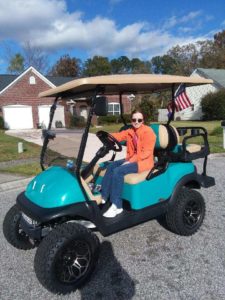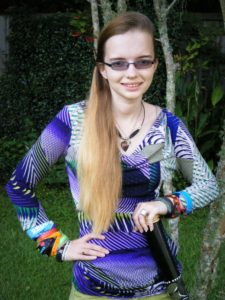By Courtney McDonald
Each morning Kelsie wakes up in her South Carolina home that she shares with her parents. She takes her medication, and (if she is scheduled to work that day) puts on her uniform, grabs her vest, picks up her badge, and packs her lunch.
 Kelsie leads the busy life of a 22-year-old young woman. She is a vocalist in the band at her church with an 8-year tenure, she has worked up to riding her bike an impressive 14.5 miles, she plays video games, and she practices driving in her golf cart.
Kelsie leads the busy life of a 22-year-old young woman. She is a vocalist in the band at her church with an 8-year tenure, she has worked up to riding her bike an impressive 14.5 miles, she plays video games, and she practices driving in her golf cart.
Kelsie was diagnosed with complete agenesis of the corpus callosum (ACC) before birth. Her parents told her about her condition when she was 8 years old. Her condition is not immediately recognizable; it primarily affects the speed at which she processes information.
“It’s pretty rare that anyone notices,” Kelsie said. “If they do it’s usually…if I’m working slower than usual. Outside of work it’s usually unnoticed.“
Kelsie works at a grocery store called Harris Teeter. In a normal day, she bags groceries, sanitizes carts, sweeps the entire store, helps customers carry groceries to their cars, rounds up carts from the parking lot, and returns unwanted groceries to the shelves.
She also occasionally cleans the restrooms. While this is not a fun task for anyone, it’s especially difficult for Kelsie due to the sound sensitivity that comes with her condition. The restrooms at Harris Teeter are equipped with motion-activated hand dryers, and cleaning the nearby sinks often sets them off. The sudden loud noise is unbearable for Kelsie, so she now wears headphones that cover her ears and muffle the noise to a tolerable level.
 Kelsie wishes people were more empathetic toward sound sensitivity and other sensory overloads.
Kelsie wishes people were more empathetic toward sound sensitivity and other sensory overloads.
“Some people I know like to generate loud noise because they know it drives me crazy and they think it’s funny,” she said. “People believe that my sound sensitivity is not real but it is.”
Because of other people’s ignorance and misconceptions about ACC, Kelsie makes raising awareness for the condition a major part of her life.
“ACC is challenging and occasionally annoying, but it helped me find my purpose in life: to accept the challenge as it is and to spread awareness about the condition,” Kelsie said.
When telling others about her condition, Kelsie wants them to know that it’s okay to ask questions about it. She also wants people to accept her for who she is, rather than letting her disorder define her.
“Having ACC makes me unique,” Kelsie said. “I am different, but it is a good kind of different.”
Read more from Kelsie on our Instagram @livingwithdcc.
This story is part of the Adults with DCC series that showcases the abilities and lives of real adults living with disorders of the corpus callosum. Students at The University of Texas at Arlington interviewed and wrote stories for this series.

